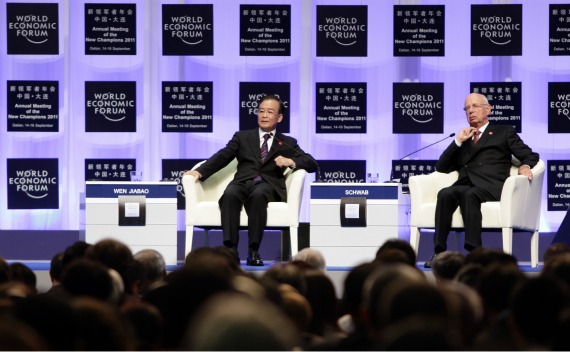China’s Premier Wen Jiabao Ups the Political Ante… Again
September 16, 2011 2:30 pm (EST)
- Post
- Blog posts represent the views of CFR fellows and staff and not those of CFR, which takes no institutional positions.
More on:

Wen Jiabao is at it again. At the World Economic Forum’s (WEF) Annual Meeting of the New Champions in Dalian, the premier broke with party ranks and openly discussed the necessity of real political reform in China. He didn’t do this in the speech he delivered to open the forum but rather, apparently, in a closed-door discussion with WEF Chairman Klaus Schwab and a group of entrepreneurs.
Reading the transcript of his remarks, I knew something good was coming when the Premier prefaced his remarks on political reform by saying: “I feel a strong sense of responsibility to present my views on various issues in an accurate and candid manner. I have talked about political structural reform on many occasions in recent years, and these views, if put together, are fairly comprehensive.”
So what did he say? Some of it was the usual stuff about rectifying inequality, promoting transparency, and rooting out corruption. And then there was the stuff that gets your hopes up.
1) “We must govern the country by law. The most important mission of a ruling party is to abide by and act in strict accordance with the Constitution and the laws. The Party should not replace the government in governance, and problems of absolute power and overconcentration of power should be redressed.”
Translation: The Party is preventing the government from running efficiently and effectively; the Party does not act according to the Constitution; and the Party abuses its power.
2) “We need to uphold judicial justice. Procuratorial and judicial authorities should keep their due independence and be free from interference by any administrative organ, social group or individual.”
Translation: China’s legal system is constantly subverted by the powerful with mal intent.
3) “People’s democratic rights and interests prescribed in the Constitution must be protected. The most important ones are the right to vote and to stay informed about, participate in and oversee government affairs.” (Wen then goes on to state that some localities are preparing the ground for elevating elections from the village to the township level.)
Translation: I know you have been waiting more than 20 years for elections to move beyond the village level. I haven’t forgotten about this, and I promise we’ll get there.
On the one hand, it is easy to say that we have heard much of this before from the hapless Premier and things never seem to change. Yet, Wen’s consistency in the points he makes, his clear signaling that he is fighting against some powerful forces (see his interview with Fareed Zakaria last year), and his insistence on continuing to press for political reform suggest that behind the scenes there may well be an epic battle playing out. While I didn’t have the time to read the thousands of comments posted on Sina Weibo about the remarks, most of the first hundred or so seemed very supportive of the Premier’s efforts to push political reform, although few seemed optimistic that he—or his presumed successor Li Keqiang—would get much traction.
As a final note, a thank you is due to Xinhua. Not every session at WEF is made available to the public, but Xinhua did us all a service and published the question and answer session in its entirety. Maybe someone at Xinhua—like so many in the media—is a friend of the Premier. Most importantly, those of us who couldn’t be there—particularly Chinese citizens—once more had the opportunity to check out the Premier taking on those who shall not be named.
More on:
 Online Store
Online Store
